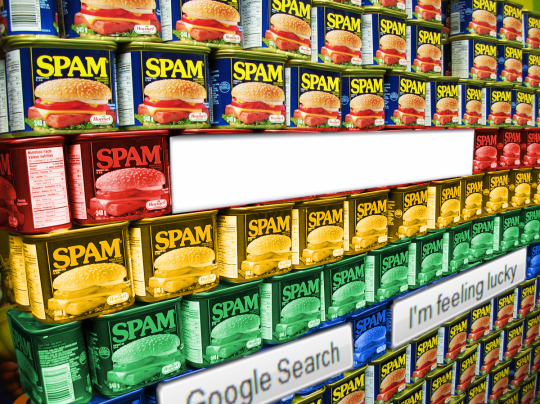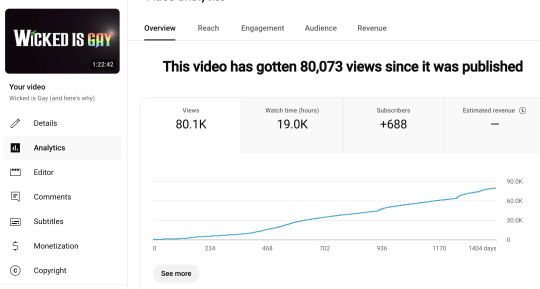#seo for google
Text
"A funny thing happened on the way to the enshittocene: Google – which astonished the world when it reinvented search, blowing Altavista and Yahoo out of the water with a search tool that seemed magic – suddenly turned into a pile of shit.
Google's search results are terrible. The top of the page is dominated by spam, scams, and ads. A surprising number of those ads are scams. Sometimes, these are high-stakes scams played out by well-resourced adversaries who stand to make a fortune by tricking Google[...]
Google operates one of the world's most consequential security system – The Algorithm (TM) – in total secrecy. We're not allowed to know how Google's ranking system works, what its criteria are, or even when it changes: "If we told you that, the spammers would win."
Well, they kept it a secret, and the spammers won anyway.
...
Some of the biggest, most powerful, most trusted publications in the world have a side-hustle in quietly producing SEO-friendly "10 Best ___________ of 2024" lists: Rolling Stone, Forbes, US News and Report, CNN, New York Magazine, CNN, CNET, Tom's Guide, and more.
Google literally has one job: to detect this kind of thing and crush it. The deal we made with Google was, "You monopolize search and use your monopoly rents to ensure that we never, ever try another search engine. In return, you will somehow distinguish between low-effort, useless nonsense and good information. You promised us that if you got to be the unelected, permanent overlord of all information access, you would 'organize the world's information and make it universally accessible and useful.'"
They broke the deal." -Cory Doctorow
Read the whole article: https://pluralistic.net/2024/02/21/im-feeling-unlucky/#not-up-to-the-task
6K notes
·
View notes
Text
Google is (still) losing the spam wars to zombie news-brands

I'm touring my new, nationally bestselling novel The Bezzle! Catch me TONIGHT (May 3) in CALGARY, then TOMORROW (May 4) in VANCOUVER, then onto Tartu, Estonia, and beyond!

Even Google admits – grudgingly – that it is losing the spam wars. The explosive proliferation of botshit has supercharged the sleazy "search engine optimization" business, such that results to common queries are 50% Google ads to spam sites, and 50% links to spam sites that tricked Google into a high rank (without paying for an ad):
https://developers.google.com/search/blog/2024/03/core-update-spam-policies#site-reputation
It's nice that Google has finally stopped gaslighting the rest of us with claims that its search was still the same bedrock utility that so many of us relied upon as a key piece of internet infrastructure. This not only feels wildly wrong, it is empirically, provably false:
https://downloads.webis.de/publications/papers/bevendorff_2024a.pdf
Not only that, but we know why Google search sucks. Memos released as part of the DOJ's antitrust case against Google reveal that the company deliberately chose to worsen search quality to increase the number of queries you'd have to make (and the number of ads you'd have to see) to find a decent result:
https://pluralistic.net/2024/04/24/naming-names/#prabhakar-raghavan
Google's antitrust case turns on the idea that the company bought its way to dominance, spending the some of the billions it extracted from advertisers and publishers to buy the default position on every platform, so that no one ever tried another search engine, which meant that no one would invest in another search engine, either.
Google's tacit defense is that its monopoly billions only incidentally fund these kind of anticompetitive deals. Mostly, Google says, it uses its billions to build the greatest search engine, ad platform, mobile OS, etc that the public could dream of. Only a company as big as Google (says Google) can afford to fund the R&D and security to keep its platform useful for the rest of us.
That's the "monopolistic bargain" – let the monopolist become a dictator, and they will be a benevolent dictator. Shriven of "wasteful competition," the monopolist can split their profits with the public by funding public goods and the public interest.
Google has clearly reneged on that bargain. A company experiencing the dramatic security failures and declining quality should be pouring everything it has to righting the ship. Instead, Google repeatedly blew tens of billions of dollars on stock buybacks while doing mass layoffs:
https://pluralistic.net/2024/02/21/im-feeling-unlucky/#not-up-to-the-task
Those layoffs have now reached the company's "core" teams, even as its core services continue to decay:
https://qz.com/google-is-laying-off-hundreds-as-it-moves-core-jobs-abr-1851449528
(Google's antitrust trial was shrouded in secrecy, thanks to the judge's deference to the company's insistence on confidentiality. The case is moving along though, and warrants your continued attention:)
https://www.thebignewsletter.com/p/the-2-trillion-secret-trial-against
Google wormed its way into so many corners of our lives that its enshittification keeps erupting in odd places, like ordering takeout food:
https://pluralistic.net/2023/02/24/passive-income/#swiss-cheese-security
Back in February, Housefresh – a rigorous review site for home air purifiers – published a viral, damning account of how Google had allowed itself to be overrun by spammers who purport to provide reviews of air purifiers, but who do little to no testing and often employ AI chatbots to write automated garbage:
https://housefresh.com/david-vs-digital-goliaths/
In the months since, Housefresh's Gisele Navarro has continued to fight for the survival of her high-quality air purifier review site, and has received many tips from insiders at the spam-farms and Google, all of which she recounts in a followup essay:
https://housefresh.com/how-google-decimated-housefresh/
One of the worst offenders in spam wars is Dotdash Meredith, a content-farm that "publishes" multiple websites that recycle parts of each others' content in order to climb to the top search slots for lucrative product review spots, which can be monetized via affiliate links.
A Dotdash Meredith insider told Navarro that the company uses a tactic called "keyword swarming" to push high-quality independent sites off the top of Google and replace them with its own garbage reviews. When Dotdash Meredith finds an independent site that occupies the top results for a lucrative Google result, they "swarm a smaller site’s foothold on one or two articles by essentially publishing 10 articles [on the topic] and beefing up [Dotdash Meredith sites’] authority."
Dotdash Meredith has keyword swarmed a large number of topics. from air purifiers to slow cookers to posture correctors for back-pain:
https://housefresh.com/wp-content/uploads/2024/05/keyword-swarming-dotdash.jpg
The company isn't shy about this. Its own shareholder communications boast about it. What's more, it has competition.
Take Forbes, an actual news-site, which has a whole shadow-empire of web-pages reviewing products for puppies, dogs, kittens and cats, all of which link to high affiliate-fee-generating pet insurance products. These reviews are not good, but they are treasured by Google's algorithm, which views them as a part of Forbes's legitimate news-publishing operation and lets them draft on Forbes's authority.
This side-hustle for Forbes comes at a cost for the rest of us, though. The reviewers who actually put in the hard work to figure out which pet products are worth your money (and which ones are bad, defective or dangerous) are crowded off the front page of Google and eventually disappear, leaving behind nothing but semi-automated SEO garbage from Forbes:
https://twitter.com/ichbinGisele/status/1642481590524583936
There's a name for this: "site reputation abuse." That's when a site perverts its current – or past – practice of publishing high-quality materials to trick Google into giving the site a high ranking. Think of how Deadspin's private equity grifter owners turned it into a site full of casino affiliate spam:
https://www.404media.co/who-owns-deadspin-now-lineup-publishing/
The same thing happened to the venerable Money magazine:
https://moneygroup.pr/
Money is one of the many sites whose air purifier reviews Google gives preference to, despite the fact that they do no testing. According to Google, Money is also a reliable source of information on reprogramming your garage-door opener, buying a paint-sprayer, etc:
https://money.com/best-paint-sprayer/
All of this is made ten million times worse by AI, which can spray out superficially plausible botshit in superhuman quantities, letting spammers produce thousands of variations on their shitty reviews, flooding the zone with bullshit in classic Steve Bannon style:
https://escapecollective.com/commerce-content-is-breaking-product-reviews/
As Gizmodo, Sports Illustrated and USA Today have learned the hard way, AI can't write factual news pieces. But it can pump out bullshit written for the express purpose of drafting on the good work human journalists have done and tricking Google – the search engine 90% of us rely on – into upranking bullshit at the expense of high-quality information.
A variety of AI service bureaux have popped up to provide AI botshit as a service to news brands. While Navarro doesn't say so, I'm willing to bet that for news bosses, outsourcing your botshit scams to a third party is considered an excellent way of avoiding your journalists' wrath. The biggest botshit-as-a-service company is ASR Group (which also uses the alias Advon Commerce).
Advon claims that its botshit is, in fact, written by humans. But Advon's employees' Linkedin profiles tell a different story, boasting of their mastery of AI tools in the industrial-scale production of botshit:
https://housefresh.com/wp-content/uploads/2024/05/Advon-AI-LinkedIn.jpg
Now, none of this is particularly sophisticated. It doesn't take much discernment to spot when a site is engaged in "site reputation abuse." Presumably, the 12,000 googlers the company fired last year could have been employed to check the top review keyword results manually every couple of days and permaban any site caught cheating this way.
Instead, Google is has announced a change in policy: starting May 5, the company will downrank any site caught engaged in site reputation abuse. However, the company takes a very narrow view of site reputation abuse, limiting punishments to sites that employ third parties to generate or uprank their botshit. Companies that produce their botshit in-house are seemingly not covered by this policy.
As Navarro writes, some sites – like Forbes – have prepared for May 5 by blocking their botshit sections from Google's crawler. This can't be their permanent strategy, though – either they'll have to kill the section or bring it in-house to comply with Google's rules. Bringing things in house isn't that hard: US News and World Report is advertising for an SEO editor who will publish 70-80 posts per month, doubtless each one a masterpiece of high-quality, carefully researched material of great value to Google's users:
https://twitter.com/dannyashton/status/1777408051357585425
As Navarro points out, Google is palpably reluctant to target the largest, best-funded spammers. Its March 2024 update kicked many garbage AI sites out of the index – but only small bottom-feeders, not large, once-respected publications that have been colonized by private equity spam-farmers.
All of this comes at a price, and it's only incidentally paid by legitimate sites like Housefresh. The real price is borne by all of us, who are funneled by the 90%-market-share search engine into "review" sites that push low quality, high-price products. Housefresh's top budget air purifier costs $79. That's hundreds of dollars cheaper than the "budget" pick at other sites, who largely perform no original research.
Google search has a problem. AI botshit is dominating Google's search results, and it's not just in product reviews. Searches for infrastructure code samples are dominated by botshit code generated by Pulumi AI, whose chatbot hallucinates nonexistence AWS features:
https://www.theregister.com/2024/05/01/pulumi_ai_pollution_of_search/
This is hugely consequential: when these "hallucinations" slip through into production code, they create huge vulnerabilities for widespread malicious exploitation:
https://www.theregister.com/2024/03/28/ai_bots_hallucinate_software_packages/
We've put all our eggs in Google's basket, and Google's dropped the basket – but it doesn't matter because they can spend $20b/year bribing Apple to make sure no one ever tries a rival search engine on Ios or Safari:
https://finance.yahoo.com/news/google-payments-apple-reached-20-220947331.html
Google's response – laying off core developers, outsourcing to low-waged territories with weak labor protections and spending billions on stock buybacks – presents a picture of a company that is too big to care:
https://pluralistic.net/2024/04/04/teach-me-how-to-shruggie/#kagi
Google promised us a quid-pro-quo: let them be the single, authoritative portal ("organize the world’s information and make it universally accessible and useful"), and they will earn that spot by being the best search there is:
https://www.ft.com/content/b9eb3180-2a6e-41eb-91fe-2ab5942d4150
But – like the spammers at the top of its search result pages – Google didn't earn its spot at the center of our digital lives.
It cheated.

If you'd like an essay-formatted version of this post to read or share, here's a link to it on pluralistic.net, my surveillance-free, ad-free, tracker-free blog:
https://pluralistic.net/2024/05/03/keyword-swarming/#site-reputation-abuse

Image:
freezelight (modified)
https://commons.wikimedia.org/wiki/File:Spam_wall_-_Flickr_-_freezelight.jpg
CC BY-SA 2.0
https://creativecommons.org/licenses/by-sa/2.0/deed.en
#pluralistic#google#monopoly#housefresh#content mills#sponcon#seo#dotdash meredith#keyword swarming#iac#forbes#forbes advisor#deadspin#money magazine#ad practicioners llc#asr group holdings#sports illustrated#advon#site reputation abuse#the algorithm tm#core update#kagi#ai#botshit
885 notes
·
View notes
Text
UH OH Google just lost an antitrust case!
“A federal U.S. judge ruled Monday that Google has illegally held a monopoly in two market areas: search and text advertising.
The landmark case from the government, filed in 2020, alleged that Google has kept its share of the general search market by creating strong barriers to entry and a feedback loop that sustained its dominance. The court found that Google violated Section 2 of the Sherman Act, which outlaws monopolies.
The ruling marks the first anti-monopoly decision against a tech company in decades.”
Article by Rohan Goswami and Jennifer Elias
436 notes
·
View notes
Note
https://www.google.com/
internet opinion on above website
If I search for how to do something, I only find ads for unrelated crap or AI generated nonsense, or occasionally a question posted identical to mine that nobody has ever answered. If I want info on something, I can look for it in quotes and get an ad for something without any words even related to what I was after. The supreme reigning search engine is almost as bad as tumblr's "nothing on this blog" when I just posted and tagged it with the search term earlier that day. The data wars are over. The advertisers won.
Oh wait, this is the FAKE facts blog. Uh... Google's is awesome!
409 notes
·
View notes
Text
hrm, I see that Fandom wiki is slowly rolling out the Quick Answers module again, the thing that everyone across all sorts of fandom spaces were dunking on because it uses GenAI to scrape the articles to try to provide short answers to simple questions it supposes people have (and was getting things WILDLY wrong, and not even regular Fandom editors wanted this module)
it does not seem that wikis selected to have Quick Answers can opt out, and the current system is that there is a dashboard where editors with the appropriate user rights can review and correct the answers—and the Answers are auto-published after thirty days. Unclear if they will still auto-publish if nobody gets around to reviewing them.
the Quick Answers is specifically stated to make Fandom wikis "more relevant and accessible to Google and eventually enhance the SEO", so it's all just for SEO (and thus ultimately for ad revenue)
anyway, install Indie Wiki Buddy, check out their list of independent wikis, check out the Nintendo Indie Wiki Alliance and the Independent Wiki Federation, visit and support and contribute to the non-Fandom wikis if one exists for your topic area
#for anyone wondering why Encyclopedia Exandria can't really TRY to appear higher in Google results—this sort of thing is why#Fandom is specifically engineered for SEO and to game Google as much as possible even down to their infrastructure#they have teams and pages and “best practices” encouraging editors to edit in ways to play to SEO rather than to information building
238 notes
·
View notes
Text

So the Wicked is Gay video just reach 80k views and 1) I obviously love that it still consistently gets views each day, especially since this video is nearing it's 4 (!) year anniversary.
but 2) i especially love to think that's bc every night about 50 people walk out of the theater and go "hmm 🤨"
#wicked#wicked the musical#gelphie#i just checked and this video didn't even have 10k in its first year (!)#so thank you ppl who keep googling 'is wicked gay?' the last 4 years#this video got copyright struck so i don't make a cent off of it#but i still appreciate it lol#SEO is weird man im just putting that out there#most videos plateau after a while which makes sense#and sometimes a video just keeps raking in the views and you just gotta shrug and go 'idk thats the algorithm lol'
96 notes
·
View notes
Text
𝗙𝗲𝗲𝗹𝗶𝗻𝗴 𝘁𝗵𝗲 𝗳𝗿𝘂𝘀𝘁𝗿𝗮𝘁𝗶𝗼𝗻 𝗼𝗳 𝗚𝗼𝗼𝗴𝗹𝗲’𝘀 𝗹𝗮𝘁𝗲𝘀𝘁 𝗮𝗹𝗴𝗼𝗿𝗶𝘁𝗵𝗺 𝘂𝗽𝗱𝗮𝘁𝗲?

Watching your website drop to the 𝟔𝐭𝐡 𝐩𝐚𝐠𝐞 can be tough, but we’re here to help. Our expert strategies are designed to get your rankings back on track, so you can regain your spot at the top.
Don’t let the update hold you back—follow @uxtitan_official l for recovery tips and more SEO insights.
#billford#hugh jackman#artists on tumblr#batman#bill cipher#deadpool and wolverine#dungeon meshi#gravity falls#house of the dragon#jujutsu kaisen#meme#funny memes#dank memes#tumblr memes#memedaddy#funny#humor#funny meme#lol#haha#seo#seo services#digital marketing#search engine optimization#google ads#search engine marketing#emailmarketing#seo changbin#seonghwa#kim seokjin
28 notes
·
View notes
Photo


Mona Lisa and the Blood Moon
Ana Lily Amirpour. 2021
Bridge
Langles Bridge, Dreyfous Dr, New Orleans, LA 70119, USA
See in map
See in imdb
#ana lily amirpour#mona lisa and the blood moon#jeon jong-seo#evan whitten#new orleans#louisiana#city park#united states#stone bridge#movie#cinema#film#location#google maps#street view#2021
32 notes
·
View notes
Text
Google reneged on the monopolistic bargain

I'm on tour with my new novel The Bezzle! Catch me TONIGHT in SALT LAKE CITY (Feb 21, Weller Book Works) and TOMORROW in SAN DIEGO (Feb 22, Mysterious Galaxy). After that, it's LA, Seattle, Portland, Phoenix and more!

A funny thing happened on the way to the enshittocene: Google – which astonished the world when it reinvented search, blowing Altavista and Yahoo out of the water with a search tool that seemed magic – suddenly turned into a pile of shit.
Google's search results are terrible. The top of the page is dominated by spam, scams, and ads. A surprising number of those ads are scams. Sometimes, these are high-stakes scams played out by well-resourced adversaries who stand to make a fortune by tricking Google:
https://www.nbcnews.com/tech/tech-news/phone-numbers-airlines-listed-google-directed-scammers-rcna94766
But often these scams are perpetrated by petty grifters who are making a couple bucks at this. These aren't hyper-resourced, sophisticated attackers. They're the SEO equivalent of script kiddies, and they're running circles around Google:
https://pluralistic.net/2023/02/24/passive-income/#swiss-cheese-security
Google search is empirically worsening. The SEO industry spends every hour that god sends trying to figure out how to sleaze their way to the top of the search results, and even if Google defeats 99% of these attempts, the 1% that squeak through end up dominating the results page for any consequential query:
https://downloads.webis.de/publications/papers/bevendorff_2024a.pdf
Google insists that this isn't true, and if it is true, it's not their fault because the bad guys out there are so numerous, dedicated and inventive that Google can't help but be overwhelmed by them:
https://searchengineland.com/is-google-search-getting-worse-389658
It wasn't supposed to be this way. Google has long maintained that its scale is the only thing that keeps us safe from the scammers and spammers who would otherwise overwhelm any lesser-resourced defender. That's why it was so imperative that they pursue such aggressive growth, buying up hundreds of companies and integrating their products with search so that every mobile device, every ad, every video, every website, had one of Google's tendrils in it.
This is the argument that Google's defenders have put forward in their messaging on the long-overdue antitrust case against Google, where we learned that Google is spending $26b/year to make sure you never try another search engine:
https://www.bloomberg.com/news/articles/2023-10-27/google-paid-26-3-billion-to-be-default-search-engine-in-2021
Google, we were told, had achieved such intense scale that the normal laws of commercial and technological physics no longer applied. Take security: it's an iron law that "there is no security in obscurity." A system that is only secure when its adversaries don't understand how it works is not a secure system. As Bruce Schneier says, "anyone can design a security system that they themselves can't break. That doesn't mean it works – just that it works for people stupider than them."
And yet, Google operates one of the world's most consequential security system – The Algorithm (TM) – in total secrecy. We're not allowed to know how Google's ranking system works, what its criteria are, or even when it changes: "If we told you that, the spammers would win."
Well, they kept it a secret, and the spammers won anyway.
A viral post by Housefresh – who review air purifiers – describes how Google's algorithmic failures, which send the worst sites to the top of the heap, have made it impossible for high-quality review sites to compete:
https://housefresh.com/david-vs-digital-goliaths/
You've doubtless encountered these bad review sites. Search for "Best ______ 2024" and the results are a series of near-identical lists, strewn with Amazon affiliate links. Google has endlessly tinkered with its guidelines and algorithmic weights for review sites, and none of it has made a difference. For example, when Google instituted a policy that reviewers should "discuss the benefits and drawbacks of something, based on your own original research," sites that had previously regurgitated the same lists of the same top ten Amazon bestsellers "peppered their pages with references to a ‘rigorous testing process,’ their ‘lab team,’ subject matter experts ‘they collaborated with,’ and complicated methodologies that seem impressive at a cursory look."
But these grandiose claims – like the 67 air purifiers supposedly tested in Better Homes and Gardens's Des Moines lab – result in zero in-depth reviews and no published data. Moreover, these claims to rigorous testing materialized within a few days of Google changing its search ranking and said that high rankings would be reserved for sites that did testing.
Most damning of all is how the Better Homes and Gardens top air purifiers perform in comparison to the – extensively documented – tests performed by Housefresh: "plagued by high-priced and underperforming units, Amazon bestsellers with dubious origins (that also underperform), and even subpar devices from companies that market their products with phrases like ‘the Tesla of air purifiers.’"
One of the top ranked items on BH&G comes from Molekule, a company that filed for bankruptcy after being sued for false advertising. The model BH&G chose was ranked "the worst air purifier tested" by Wirecutter and "not living up to the hype" by Consumer Reports. Either BH&G's rigorous testing process is a fiction that they infused their site with in response to a Google policy change, or BH&G absolutely sucks at rigorous testing.
BH&G's competitors commit the same sins – literally, the exact same sins. Real Simple's reviews list the same photographer and the photos seem to have been taken in the same place. They also list the same person as their "expert." Real Simple has the same corporate parent as BH&G: Dotdash Meredith. As Housefresh shows, there's a lot of Dotdash Meredith review photos that seem to have been taken in the same place, by the same person.
But the competitors of these magazines are no better. Buzzfeed lists 22 air purifiers, including that crapgadget from Molekule. Their "methodology" is to include screenshots of Amazon reviews.
A lot of the top ranked sites for air purifiers are once-great magazines that have been bought and enshittified by private equity giants, like Popular Science, which began as a magazine in 1872 and became a shambling zombie in 2023, after its PE owners North Equity LLC decided its googlejuice was worth more than its integrity and turned it into a metastatic chumbox of shitty affiliate-link SEO-bait. As Housefresh points out, the marketing team that runs PopSci makes a lot of hay out of the 150 years of trust that went into the magazine, but the actual reviews are thin anaecdotes, unbacked by even the pretense of empiricism (oh, and they loooove Molekule).
Some of the biggest, most powerful, most trusted publications in the world have a side-hustle in quietly producing SEO-friendly "10 Best ___________ of 2024" lists: Rolling Stone, Forbes, US News and Report, CNN, New York Magazine, CNN, CNET, Tom's Guide, and more.
Google literally has one job: to detect this kind of thing and crush it. The deal we made with Google was, "You monopolize search and use your monopoly rents to ensure that we never, ever try another search engine. In return, you will somehow distinguish between low-effort, useless nonsense and good information. You promised us that if you got to be the unelected, permanent overlord of all information access, you would 'organize the world's information and make it universally accessible and useful.'"
They broke the deal.
Companies like CNET used to do real, rigorous product reviews. As Housefresh points out, CNET once bought an entire smart home and used it to test products. Then Red Ventures bought CNET and bet that they could sell the house, switch to vibes-based reviewing, and that Google wouldn't even notice. They were right.
https://www.cnet.com/home/smart-home/welcome-to-the-cnet-smart-home/
Google downranks sites that spend money and time on reviews like Housefresh and GearLab, and crams botshittened content mills like BH&G into our eyeballs instead.
In 1558, Thomas Gresham coined (ahem) Gresham's Law: "Bad money drives out good." When counterfeit money circulates in the economy, anyone who gets a dodgy coin spends it as quickly as they can, because the longer you hold it, the greater the likelihood that someone will detect the fraud and the coin will become worthless. Run this system long enough and all the money in circulation is funny money.
An internet run by Google has its own Gresham's Law: bad sites drive out good. It's not just that BH&G can "test" products at a fraction of the cost of Housefresh – through the simple expedient of doing inadequate tests or no tests at all – so they can put a lot more content up that Housefresh. But that alone wouldn't let them drive Housefresh off the front page of Google's search results. For that, BH&G has to mobilize some of their savings from the no test/bad test lab to do real rigorous science: science in defeating Google's security-through-obscurity system, which lets them command the front page despite publishing worse-than-useless nonsense.
Google has lost the spam wars. In response to the plague of botshit clogging Google search results, the company has invested in…making more botshit:
https://pluralistic.net/2023/02/16/tweedledumber/#easily-spooked
Last year, Google did a $70b stock buyback. They also laid off 12,000 staffers (whose salaries could have been funded for 27 years by that stock buyback). They just laid off thousands more employees.
That wasn't the deal. The deal was that Google would get a monopoly, and they would spend their monopoly rents to be so good that you could just click "I'm feeling lucky" and be teleported to the very best response to your query. A company that can't figure out the difference between a scam like Better Homes and Gardens and a rigorous review site like Housefresh should be pouring every spare dime it brings in into fixing this problem. Not buying default search status on every platform so that we never try another search engine: they should be fixing their shit.
When Google admits that it's losing the war to these kack-handed spam-farmers, that's frustrating. When they light $26b/year on fire making sure you don't ever get to try anything else, that's very frustrating. When they vaporize seventy billion dollars on financial engineering and shoot one in ten engineers, that's outrageous.
Google's scale has transcended the laws of business physics: they can sell an ever-degrading product and command an ever-greater share of our economy, even as their incompetence dooms any decent, honest venture to obscurity while providing fertile ground – and endless temptation – for scammers.

If you'd like an essay-formatted version of this post to read or share, here's a link to it on pluralistic.net, my surveillance-free, ad-free, tracker-free blog:
https://pluralistic.net/2024/02/21/im-feeling-unlucky/#not-up-to-the-task
#pluralistic#monopoly#seo#dark seo#google#search#enshittification#platform decay#product reviews#spam#antitrust#trustbusting
717 notes
·
View notes
Text
#when you google stray kids 😭#stray kids#bang chan#changbin#han jisung#seo changbin#felix lee#hwang hyunjin#hyunjin#lee know#seungmin#yang jeongin
21 notes
·
View notes
Text

BOOST your Google Business Profile TO THE TOP of local search with www.VictoryLocal.co.uk
29 notes
·
View notes
Text
hate when i google drug interactions and every website is like "uhm... doing dwugs is bad for you... evewy dwug has intwaction wisks... you just shouldn't combine any dwugs at all, just to be safe!" like. i AM aware all drugs have interaction risks. thats why im here instead of doing drugs currently. so can you just cut the shit and tell me whether this will make the medication ineffective or kill me
#good idea generator#second least favourite is websites that are like 'there is an interaction. no we're not telling what it is. thats a secret' TELL ME#third least favourite is 'theres no drug interactions at all but still dont do it anyway' do NOT lecture me. jesus#also as with every google search most of the results are seo possibly ai bullshit so#drugs.com interaction checker my beloved. sorry i tried to verify your info#am never venturing into the wilds like that again
23 notes
·
View notes
Text
Do ya'll remember when you could go to that "advanced search" page on google? The page that looked like a library's search engine?
Did you know it still exists??? Cus I sure didn't! It's like it's its (its it's its for good measure) own webpage now, but she lives! You just have to search "google advanced search" and its the first result
Completely worthless info to me personally since I use duckduckgo or ecosia which you should too btw, but hey! Maybe that knowledge will help someone out there since AI SEO blah blah has razed the internet to the ground
#google#advanced search#TIL#today i relearned#SEO#fuck google#but this is useful#anti ai#search engine#duckduckgo#ecosia#seriously USE THOSE TWO INSTEAD#this is an order
32 notes
·
View notes
Text

29 notes
·
View notes